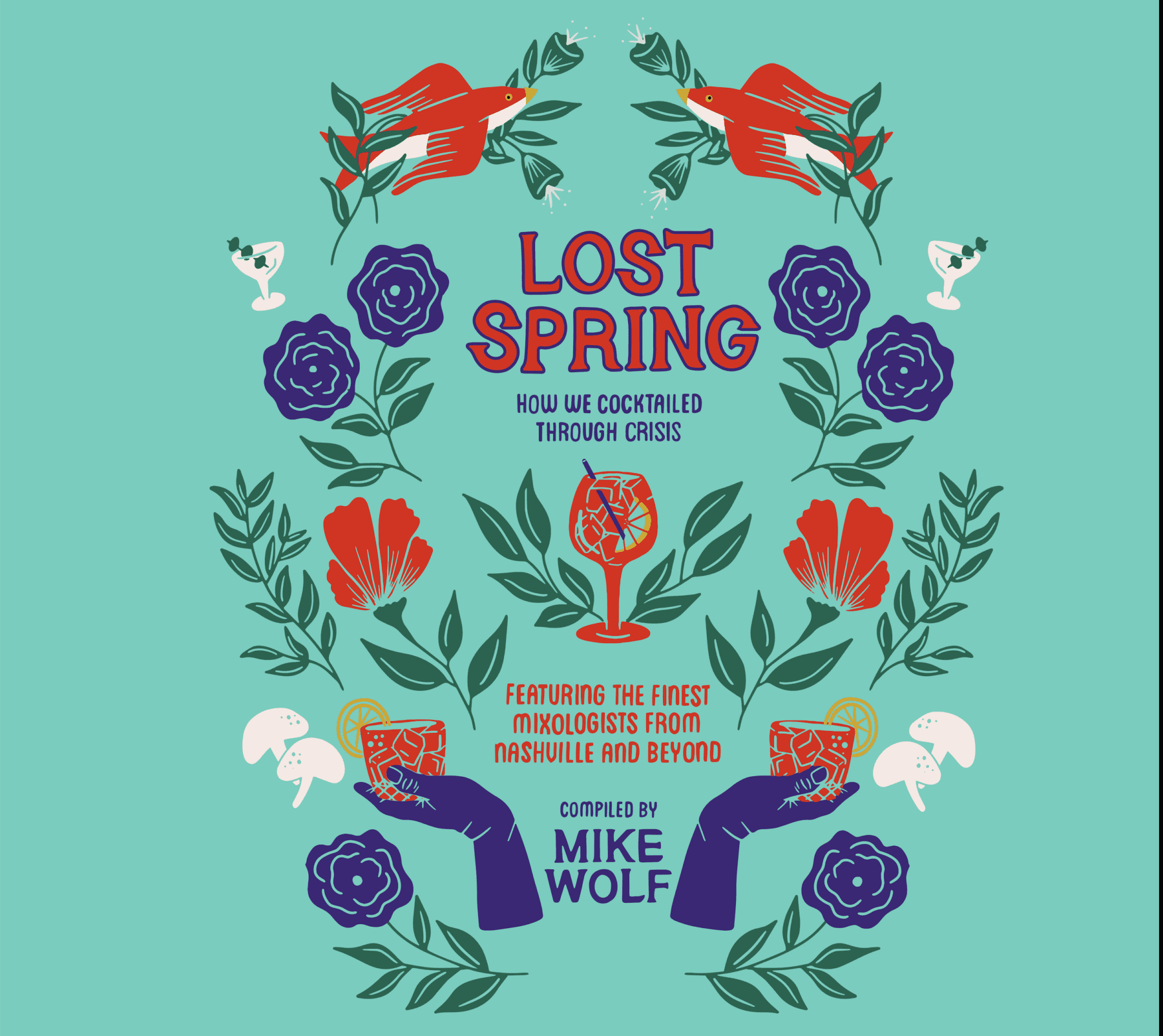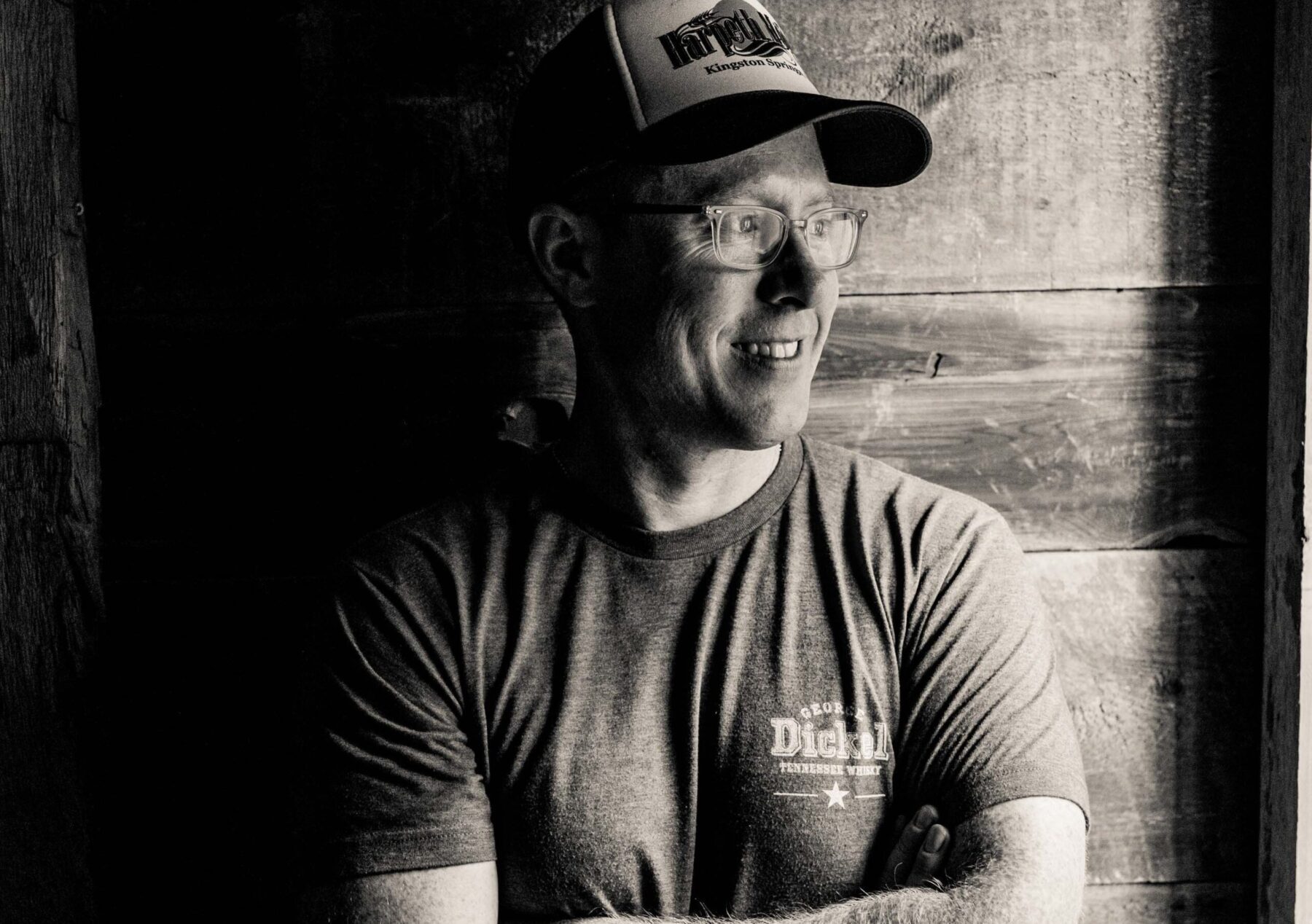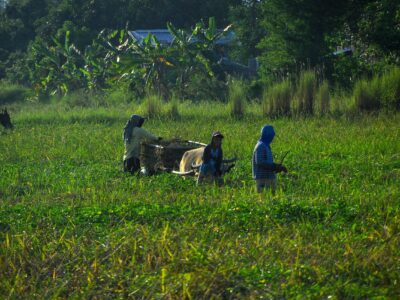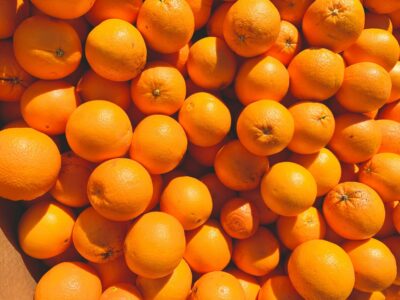Writer and cocktail innovator Mike Wolf has made a name for himself crafting thoughtful and equally delicious libations inspired by shifting seasons and southern terroir. From building the bar program at Husk alongside venerable chef Sean Brock, to opening the tiki bar, Chopper, to writing Garden to Glass: Grow Your Drinks from the Ground Up and now a second book, Lost Spring: How We Cocktailed Through Crisis, Wolf has maintained a down-to-earth sensibility rooted in his homegrown garden in Nashville, blooming with upwards of 30 different herbs and vegetables dedicated to very best cocktails and elixirs. I caught up with Wolf on his new book and how the COVID-era is (re)shaping his life, his garden, and his drinks.

The conversation begins with what Wolf calls “the lost spring,” which led him to write his new book. On March 2, just as COVID began to spread across the nation, a 165-mph tornado tore through Nashville, taking down 771 buildings and killing 24 people across four counties. A few weeks after the storm, Wolf took the long way along the river to the east side’s beloved Woodland Wine Merchant, and as he drove past houses with their roofs blown off and cars crushed by trees, he was struck again with the enormity of the devastation. A new disaster was looming, a virus that would separate a community in desperate need of rebuilding. “Everything was just hitting me there, not only for the world and America, but even Nashville. I thought, man this city is not gonna be the same ever again. You start to feel really helpless.” He called Stephanie Bowman at Turner Publishing: “So I was writing about the absolute platinum age of American drinking,” he laughs, “and now, yeah people are drinking, people are drinking more. At home. I was trying to think about how I can write something timeless, and of course we’re talking about the tornado and the fallout there and the restaurants and feeling helpless and she was like, ‘you know, we should do something.’”
Wolf started calling up his friends — bartenders, sommeliers, and industry experts – many from Nashville, along with an impressive crew from Atlanta, Charleston, Chicago, Los Angeles, and New York City. “I was apprehensive about sending bartenders a bunch of personal questions and also asking them to get me a recipe and get it to me by this date — it felt like giving people an assignment. But a lot of people, when they sent things back, said ‘it felt good to do this,’ or ‘this was kind of therapeutic.’”
From their generous responses, Wolf stitched together a patchwork state of the union, homespun, honest, and oddly comforting in its vulnerability. An inspiring testament to the resilience of people who are in it for the love of it, over 50 industry luminaries share what they’ve missed most about being behind the bar, how they’re planning to return, and in the meantime — what they’ve been reading, watching, listening to and most importantly, drinking.
In the book’s introduction Wolf writes: “By the time spring of 2021 rolls around, beverage professionals will have more new ideas, filtered through all the time they spent pondering, reading, writing, and listening. Getting inspired. That’s one thing about the time away from bartending for so many professionals: there was time to reinvest in our own well-being; be creative, slow down a little.” Well-being is one thing, but for those of us living on frozen pizza Wolf goes on, “There are plenty of music and binge-watching suggestions, and even some wine pairings for frozen food. How 2020 is that? I hope this can somewhat fill in for the conversations you may have had whilst posted up at a bar and drinking something special during a unique period in our history which will always be, to me anyways, the Lost Spring, where so much was lost and I still believe, much will be gained.” Lost Spring: How We Cocktailed Through Crisis is out September 1 as an e-book and will be available in print in May 2021. A portion of the sales goes to Tennessee Action for Hospitality to support service industry workers statewide.
As with all of us, COVID has changed the course of Wolf’s life. “Doing this book it was really cool to get in touch with/hound a lot of people for a recipe and for their thoughts during quarantine, to be connected to everybody in lieu of going out and seeing people in their bars, but yeah, I’m feeling really disconnected from people right now.” With his wife hard at work saving lives in the Vanderbilt University Medical Center ER, Wolf is currently “Parent in Chief” of two wee ones, spending his days supporting their virtual learning. Last spring Wolf’s Garden to Glass book tour was canceled due to the shutdown. He’d spent 2019 opening the long-awaited Chopper, a deliciously unconventional tiki bar he co-owned with Andy Mumma of Barista Parlor fame. “Through all of it my garden last year was terrible. These rabbits, and probably a fox, they were just helping themselves. I thought ‘good for you, I’m glad someone’s enjoying it.’ It was just a mess.”
When asked how his garden is now, he lights up. “My garden is by far the best it has ever been. I got to dive into preparing it this spring, doing all that work where you’re helping to prepare the soil and till and plow in your cover crops that you might have had growing. It paid in dividends. I built a fence around it. I was able to trellis some things. It was a dream this year compared to when it’s been the last few years when I’m writing a book about gardening and trying to open a bar. What happens is that your garden looks terrible.”
For Wolf, what happens in the garden is pretty important. “One thing that I realized when I got into growing things and using the space in my house to carve out a garden wherever I could, is how therapeutic it was. You juxtapose that with working at a super busy bar, it’s a nice balance and I think that’s why bartenders get so into it.” He references studies that show positive health benefits of putting your hands in the dirt, lowered blood pressure, increased serotonin. “It definitely makes sense there’s this whole other side to the industry that could potentially help people out just by growing a couple cucumbers and a basil plant.”
In his book Garden to Glass, Wolf digs deeper. “Gardening is a lot like the bar and restaurant business. Just when you think you’ve got a handle on things, something unforeseen happens and you have a whole new set of problems on your hands. You think you’ve mastered one particular area only to discover you never really knew how much you thought you did. The more you know or come to learn, the more you realize you’ve been doing things wrong. But once you settle into the mindset that you’re going to learn a little something new every day, that obstacles are always waiting around the corner, that nature is unpredictable and wiser than you, then you realize that all these little mistakes you’re making are the seeds falling in the dirt which will grow again — as wisdom in bloom.”
Wolf’s wisdom was born out of necessity, and a healthy curiosity. Charged with creating the cocktails to match chef Sean Brock’s celebrated southern fare, he realized “If I wanted something, I was gonna need to grow it.” According to Brock, there was a bit of friendly competition in the kitchen garden and when Wolf was told to back off the lovage, he showed up with bushels of herbs from home. Soon all sorts of new delights were sprouting on the bar patio. As Wolf told me: “There’s always more to learn about the plants that we use or that we grow.” He refers to what he details in Garden and Glass, suggesting tomato leaves to replace basil in a pesto. “They have this beautiful aroma. When you get into growing tomatoes, someone might say to plant parsley and basil around it because the things that go well planted around tomatoes or cucumbers are the things that go well in the kitchen. It’s fascinating, but then you realize when you pull off a tomato leaf, you’re like ‘wow that smells like parsley and basil!’ Even if you’re not growing things nearby, you realize that everything is connected and — not to get too crazy — but these plants are communicating in some way that we don’t really know.”
By the end of Garden to Glass you’ll believe anything Wolf says, even the “crazy” stuff. Harvest is a perfect time of year to peruse the colorful pages and sip something straight from the earth. And if you’re still holding on fast to summer’s warmth, don’t worry. Wolf writes: “I’ve found that there aren’t actually four distinct seasons; there are instead waves that ripple back and forth, offering up short-lived windows where trees flower, roots become too tough to use, and some ingredients are only perfect for a short time… Different seasons are harmonious with each other, and there are plenty of drink ideas lying in the space between seasons.” One such drink is Wolf’s “Fall Mint Julep,” premiering in Lost Spring as a pivot on the classic, since this year’s Kentucky Derby was delayed to September. And as we enter the time of year that our gardens slow down or close up shop entirely, Wolf urges us to take heart: “Gardening taught me that as things decay, they are merely setting the state for rebirth.”
LIGHTNING ROUND
THE OCCASIONAL OPTIMIST
I’m the one who edits my podcast, Liquid Gold, and I notice I use the word beautiful all the time. ‘It’s a beautiful thing, this tequila’s beautiful, this cucumber’s beautiful,’ I’m like ‘geez, what an optimist.’ The occasional optimist, that’s me.’
MEETING WOMEN IN BARS
I started bartending in college before I was 21. It was a Chinese-Vietnamese place in Boulder that had a huge rooftop deck and it’s actually where I met my wife which is funny. So you can meet your wife in a bar.
SUSTAINABLE COCKTAILS 101
Composting is huge. Everything from your coffee grounds to your eggshells to using your citrus rinds and composting those.
SURVIVING IN THE TIME OF COVID
I’ve been doing a lot of cooking and that makes my wife really happy. She might be off for two or three days and she can request something, like chile rellenos, real New Mexican-style cause we used to love going to New Mexico when we lived in Colorado so I say, alright, ‘I’m gonna make the most amazing chile rellenos I possibly can.’ It’s really gratifying when you do something as simple as that and it seems, at least for that night, to make a big difference around your house, kind of lift people up. It’s been good for my daughter too, she’s like ‘I wanna help dad.’ So that’s been great.
ON THE NIGHTSTAND
David Berman. His book Actual Air just knocked my socks off twenty years ago and it’s something I’ve come back to in these times to be inspired.
IN STEREO
June Tabor. She’s this amazing mystical English folk singer. Her interpretations are amazing. Check out her version of the nearly 300-year-old song “10,000 Miles.”





